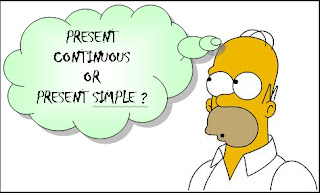Present Simple
The Simple Present tense in English is used to describe an action that is regular, true or normal.
We often use the Present Simple with the Frequency Adverbs (always; usually, often, generally, regularly; sometimes; seldom; never) when we talk about regular actions, habitual actions or daily routine
We use the present tense:
1. For repeated or regular actions in the present time period.
- I always take the train to the office.
- The train to Berlin leaves every hour. (3rd person singular)
- John sleeps eight hours every night during the week. (3rd person singular)
2. For facts.
- The President of The USA lives in The White House.
- A dog has four legs. ( 3rd person singular)
- We come from Switzerland.
3. For habits.
- I get up early every day.
- Carol brushes her teeth twice a day.
- They usually travel to their country house at the weekend.
4. For things that are always / generally true.
- It rains a lot in winter. (3rd person singular)
- The Queen of England lives in Buckingham Palace. (3rd person singular)
- They speak English at work.
The Present Continuous
1.We use the Present Continuous Tense to talk about activities happening now.
Examples: 1.We use the Present Continuous Tense to talk about activities happening now.
The kids are watching TV. (Affirmative)
- I am sitting down, because I am tired. (Affirmative)
- I am not learning German, because this is an English class. (Negative)
- Who are you writing to? ( Interrogative)
Examples:
Sally is studying really hard for her exams this week.
- I am reading a really interesting book now.
- How are you brushing up on your English for the trip?
- We aren't working hard these days.
Examples:
» I am seeing my dentist on Wednesday.
» Polly is coming for dinner tomorrow.
» Are you doing anything tonight?
» We aren't going on holiday next week.
